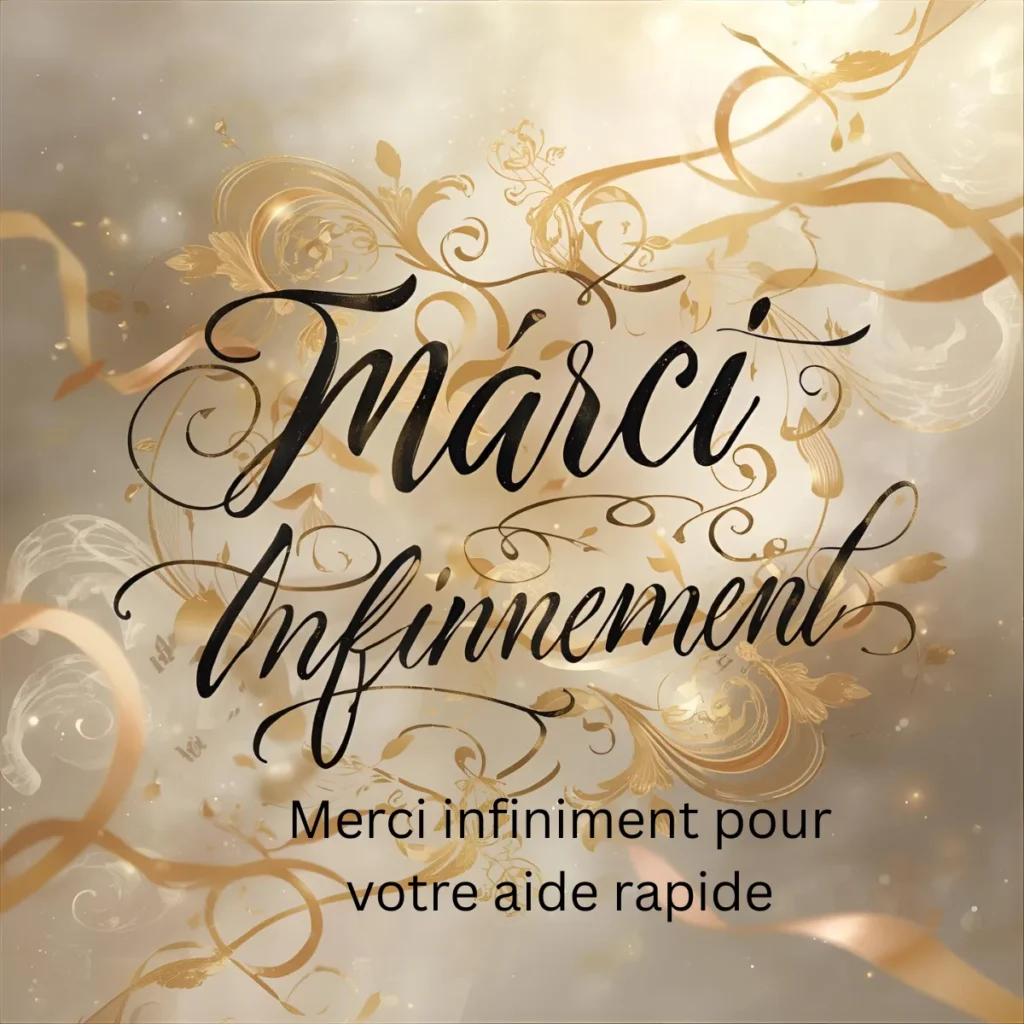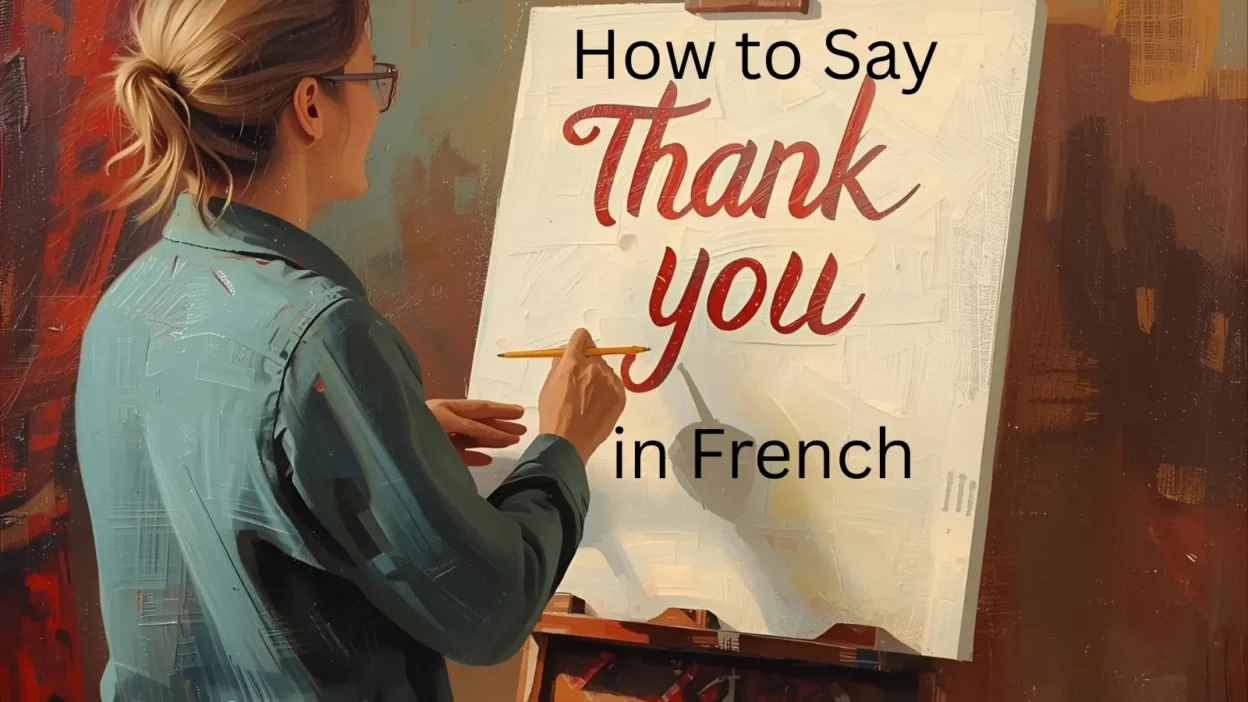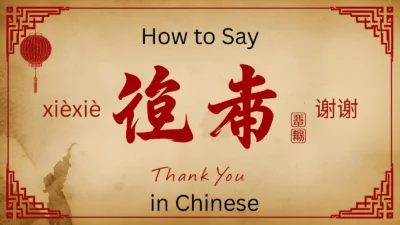Learning how to say thank you in French is one of the first steps to sounding polite and respectful when speaking the language. The most common way to express gratitude is merci, but French also has many variations depending on the tone, level of formality, and situation.
Whether you’re traveling in France, studying the language, or interacting with native speakers, knowing the right phrase will help you connect more naturally and leave a positive impression.
Thank You in French
Here’s a 15-phrases table for different ways to say Thank You in French with English meaning, French phrase, pronunciation, and usage:
| # | English Phrase | French Phrase | Pronunciation | Usage / Context |
|---|---|---|---|---|
| 1 | Thank you | Merci | mehr-see | Most common, everyday |
| 2 | Thanks a lot | Merci beaucoup | mehr-see boh-koo | Polite, strong thanks |
| 3 | Many thanks | Mille mercis | meel mehr-see | Casual, warm |
| 4 | Thank you kindly | Merci bien | mehr-see byan | Informal, friendly |
| 5 | Thank you very much | Grand merci | grahn mehr-see | Extra gratitude |
| 6 | Thanks a ton | Un grand merci | uh grahn mehr-see | Strong emphasis |
| 7 | Sincere thanks | Merci sincèrement | mehr-see san-sehr-mahn | Formal, heartfelt |
| 8 | Thank you all | Merci à tous | mehr-see ah toos | Group context |
| 9 | Thanks for everything | Merci pour tout | mehr-see poor too | Deep gratitude |
| 10 | Thanks again | Merci encore | mehr-see ahn-kor | Polite repetition |
| 11 | Infinite thanks | Merci infiniment | mehr-see an-fee-nee-mahn | Very strong, formal |
| 12 | Thanks a million | Mille fois merci | meel fwah mehr-see | Warm, casual |
| 13 | Thanks for your help | Merci de ton aide | mehr-see duh ton ed | Everyday phrase |
| 14 | Thanks politely | Je vous remercie | zhuh voo ruh-mehr-see | Very formal, respectful |
| 15 | With gratitude | Avec gratitude | ah-vek grah-tee-tood | Polite, written form |
Let’s explore 15 different ways to say thank you in French, complete with real conversation examples and the origins or cultural context of each phrase.
1. Merci (Thank you)
Origin:
From the Latin merces, meaning reward or payment. It became “merci” in Old French and has remained the most common way to say “thanks.”
Example:
👤 User A: Voici votre café.
👤 User B: Merci !
Use: Standard and universal; works in any situation.
2. Merci beaucoup (Thank you very much)

Origin:
“Beaucoup” means “a lot.” Combined with “merci,” this phrase amplifies the gratitude.
Example:
👤 User A: Je vous ai aidé à réserver votre billet.
👤 User B: Merci beaucoup ! Vous êtes très gentil.
Use: Formal or casual; a polite way to show deeper appreciation.
3. Un grand merci (A big thank you)
Origin:
This phrase puts emphasis on the size of your thanks, often used in emails, cards, or formal thanks.
Example:
👤 User A: Merci pour tout ce que vous avez fait.
👤 User B: Un grand merci à vous !
Use: Slightly more emotional or formal than “merci beaucoup.”
4. Merci infiniment (Thank you infinitely)

Origin:
A poetic or grand way to show boundless gratitude, often found in writing or formal speech.
Example:
👤 User A: J’ai reçu votre colis aujourd’hui.
👤 User B: Merci infiniment pour votre aide rapide !
Use: Formal, literary, or heartfelt contexts.
5. Je vous remercie (I thank you – formal)
Origin:
A direct and formal structure, often used in business, emails, or when addressing someone with respect.
Example:
👤 User A: J’ai bien reçu votre candidature.
👤 User B: Je vous remercie de m’avoir contacté.
Use: Very formal or professional tone.
6. Je te remercie (I thank you – informal)
Origin:
The informal version of “je vous remercie,” using tu instead of vous.
Example:
👤 User A: J’ai corrigé ton devoir.
👤 User B: Super, je te remercie !
Use: Friendly and casual with people you know well.
7. Merci bien (Thanks a lot – with nuance)

Origin:
Sounds like “merci beaucoup” but can carry a sarcastic tone depending on context.
Example:
👤 User A: Tu as mangé tout le gâteau ?
👤 User B: Oui…
👤 User A: Ah, merci bien !
Use: Neutral to sarcastic; tone is key.
8. C’est gentil, merci ! (That’s kind, thank you!)
Origin:
Combining gratitude with acknowledgment of kindness, this is often used in polite conversation.
Example:
👤 User A: Je vous ai apporté un peu de chocolat.
👤 User B: Oh, c’est gentil, merci !
Use: Friendly, often used with small favors or thoughtful gestures.
9. Merci mille fois (Thanks a thousand times)
Origin:
A dramatic and enthusiastic way to say “thank you,” used in heartfelt or emotional contexts.
Example:
👤 User A: J’ai récupéré ton passeport perdu.
👤 User B: Merci mille fois ! Je te dois une fière chandelle !
Use: Very warm and emotional; shows deep gratitude.
10. Merci d’avance (Thanks in advance)
Origin:
Common in French emails or requests, this expresses appreciation before the favor is done.
Example:
👤 User A: Peux-tu m’envoyer le rapport ce soir ?
👤 User B: Bien sûr. Merci d’avance !
Use: Professional, polite when making requests.
11. Merci pour tout (Thanks for everything)
Origin:
Used to express global gratitude, especially when someone has helped you in many ways.
Example:
👤 User A: Je suis content que tu sois venu.
👤 User B: Merci pour tout, vraiment.
Use: Warm, sincere, often at the end of an experience or help.
12. Je ne sais pas comment te/vous remercier (I don’t know how to thank you)
Origin:
A dramatic and sincere expression used when someone has done a great favor.
Example:
👤 User A: Tu m’as sauvé la vie avec ce conseil.
👤 User B: Je ne sais pas comment te remercier.
Use: Deeply grateful; formal or informal depending on te/vous.
13. Avec tous mes remerciements (With all my thanks)
Origin:
A formal phrase often used in written French—letters, emails, or end-of-speech acknowledgments.
Example:
👤 User A: Je vous souhaite une bonne continuation.
👤 User B: Avec tous mes remerciements pour votre confiance.
Use: Written or formal spoken French.
14. Chapeau ! Et merci ! (Hats off! And thank you!)
Origin:
“Chapeau” is an idiomatic expression meaning “hats off”—a way to show admiration and gratitude.
Example:
👤 User A: Tu as fini ce projet en deux jours ?
👤 User B: Oui.
👤 User A: Chapeau ! Et merci pour ton aide aussi.
Use: Informal, expressive; shows appreciation and admiration.
15. Merci du fond du cœur (Thank you from the bottom of my heart)
Origin:
A touching way to express sincere and emotional thanks—often used in heartfelt situations.
Example:
👤 User A: Merci du fond du cœur pour tout ce que tu as fait pour moi.
👤 User B: Tu n’as pas à me remercier. C’est normal.
Use: Very personal and emotional; often in sensitive or sentimental situations.
FAQs
1. What is the most common way to say Thank You in French?
The most common phrase is “Merci.”
2. How do I say Thank You very much?
Say “Merci beaucoup.” It means Thank you very much.
3. How do I say Thanks politely?
You can say “Je vous remercie.” (formal/polite)
For friends, “Je te remercie” works.
4. How do I say Thanks a lot casually?
Say “Merci bien” or just “Merci.”
5. How do I say Thank You for your help?
Say “Merci pour votre aide.” (formal)
Or “Merci pour ton aide.” (informal)
6. How do I respond when someone says “Thank You”?
Common responses:
- “De rien” – You’re welcome
- “Avec plaisir” – With pleasure
7. How do I say Thanks in a heartfelt way?
Say “Merci infiniment” or “Merci du fond du cœur.”
8. Can I say “Merci” in writing?
Yes, it works perfectly in messages, emails, or cards.
9. How do I say Thanks to a group of people?
Say “Merci à tous.” (Thanks to everyone)
10. Is “Merci” enough for formal situations?
Yes, but for extra politeness, use “Je vous remercie beaucoup.”
Conclusion:
Learning how to say thank you in French goes beyond just knowing merci. From casual to formal expressions, choosing the right phrase allows you to show respect, gratitude, and warmth in any situation.
Mastering these variations will make your conversations smoother and more authentic.



